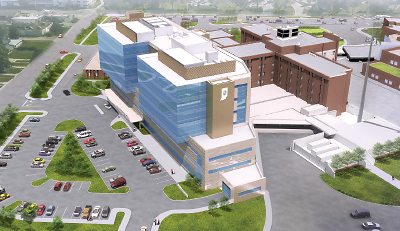The new Indiana Neuro-Institute and Advanced Treatment Center in Indianapolis will be connected to Community Hospital East to link psychiatric and other medical care.
Indiana health officials joined Lt. Gov. Eric Holcomb in August to break ground for the Indiana Neuro-Diagnostic Institute and Advanced Treatment Center (NDI). The new psychiatric hospital in Indianapolis is designed to evaluate and treat mental illness in a variety of patient populations before referring them to other state or community treatment settings for long-term follow-up.
The integrated system of care that will function within the building will be as contemporary as the facility, said geriatric psychiatrist John Wernert, M.D., M.H.A., secretary of the Indiana Family and Social Services Administration (FSSA), an APA distinguished fellow, former APA Board of Trustees member, and past chair of the APAPAC Board of Directors.
Wernert became head of the FSSA in June 2014, the first psychiatrist to hold this position. The agency portfolio includes Medicaid, mental health, aging, disability and rehab services, family resources, and early child care and pre-kindergarten. About 43 percent of the Indiana state budget passes through the administration, he said.
“This new institute is another part of our strong commitment to improving health care in Indiana and to caring for our most vulnerable fellow citizens,” said Gov. Mike Pence (R) in a statement announcing the project last December.
The core of Indiana’s public mental health care has been a constellation of six state psychiatric hospitals. Like most states, Indiana closed many state facilities over the past 40 years, going from over 6,000 state beds to 800 today. One of Wernert’s first tasks was to get the six hospitals to function as a single system by developing uniform admission and discharge protocols, standard electronic medical records, drug formularies, and even dietary planning.
“We wanted to have the concept of one hospital with six campuses,” he said. NDI will further consolidate that system by serving as the diagnostic center of excellence and the hub of the distributive model of care.
For a start, NDI will replace one aging state facility, the LaRue Carter Memorial Hospital in Indianapolis, built in 1931 as a veterans hospital. The state acquired the hospital in 1998 and has been carrying a census of 120 mentally ill children, adolescents, and adults in central Indiana’s only state mental facility. However, the building’s design and deteriorating physical condition have made it less and less appropriate for modern mental health care, according to a feasibility study.
The 159-bed, $120 million NDI facility will serve as a diagnostic and acute treatment center not only for mental illnesses, including substance use disorders, but also for traumatic brain injury, intellectual and developmental disabilities, and neurodegenerative diseases. Psychiatrist Jerry Sheward, M.D., has been named chief medical officer and is leading the design and transition phases now under way.
NDI will open in late 2018 and will integrate psychiatric and medical care, continuing one of Wernert’s longstanding goals. Beginning in 2010, he worked with several federally qualified health centers and other rural practices in Indiana to move psychiatric care into primary medical settings and wanted to apply that principle to the state hospitals.
“Most state psychiatric facilities are located in rural areas, far from medical hospitals, which makes care challenging for our aging patient population,” he said. “An elderly patient with schizophrenia, for instance, might also have diabetes, emphysema, and renal disease and need as much medical as psychiatric care.”
To that end, NDI will be on the campus of Indianapolis Community East Hospital, a tertiary care hospital that is part of Community Health Network, the partner in NDI’s management. The pairing of the two facilities may also reduce some duplication of technology and services. For instance, Community East also houses a cancer center, and NDI will be able to use its fMRI and PET scanners. Specialty medical services will be attached and readily available for the NDI patient population. The hospital’s emergency room will also serve as a venue to manage intoxicated or acutely aggressive patients.
NDI expects to care for about 1,500 patients each year. For most, average length of stay is likely to be measured in weeks following evaluation and initial treatment. Beyond that point, patients will be referred to one of the five other state hospitals or to the 25 community mental health centers or to other community-based settings around the state.
The new building will be subdivided to serve a variety of patient populations. Twelve beds are allotted to children, including those with autism spectrum disorder or developmental disabilities. A 30-bed unit will serve adolescents, especially those with early-onset schizophrenia. Adults with severe mental illness will be housed in a 15-bed unit, while both qualifying children and adults may be placed in a 12-bed research unit.
A short-stay, 15-bed neuropsychiatric diagnostic unit will allow evaluation and treatment planning for difficult cases before they are sent for follow-up hospital or community care.
In addition, NDI will have a 24-bed forensic unit on the seventh floor with a separate drive-in entry at ground level and a secure elevator for access. The building will house its own courtroom to handle competency and other forensic cases without raising security risks or imposing potential staff shortages caused by transporting patients to regular courts elsewhere.
NDI also will have a dedicated research unit that will build on existing relationships with biotechnology partners and research universities such as Indiana University and Purdue University. The state will be able to partner with other hospital systems and BioCrossroads, a consortium of health systems, biotech companies, device manufacturers, and pharmaceutical companies, including locally based Eli Lilly and Co.
While no formal academic affiliation exists for the moment, the Community Health System began its own training program this year with four psychiatry residents and will build up that number to 16 over the next four years.
Like most new psychiatric hospitals, NDI will adopt a contemporary approach to architecture that eschews the ponderous asylums of yesteryear.
“It doesn’t look like a prison or a state hospital,” said Wernert. “There is a lot of glass and light and open interior space. The design honors patients and their families, and creates a modern environment for healing.” ■
More information on the Indiana Neuro-Diagnostic Institute and Advanced Treatment Center can be accessed
here.

